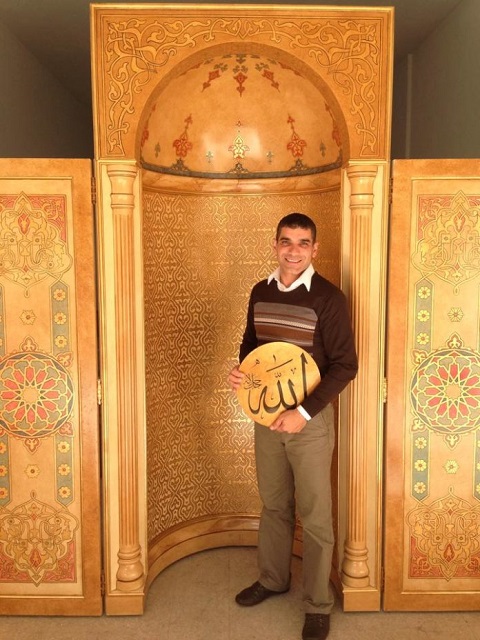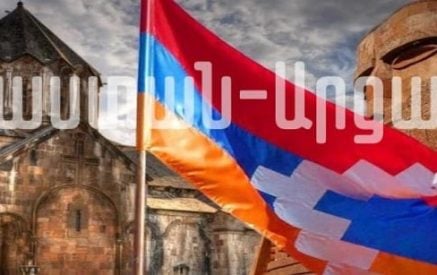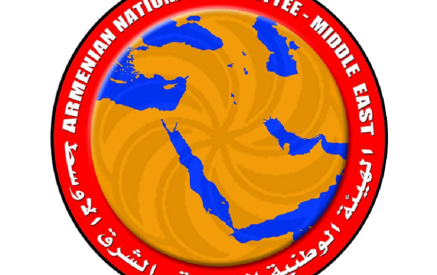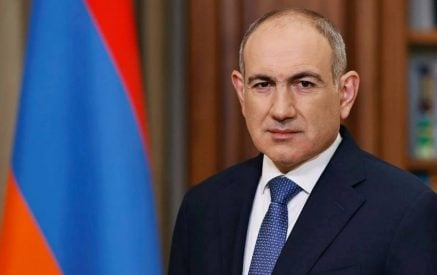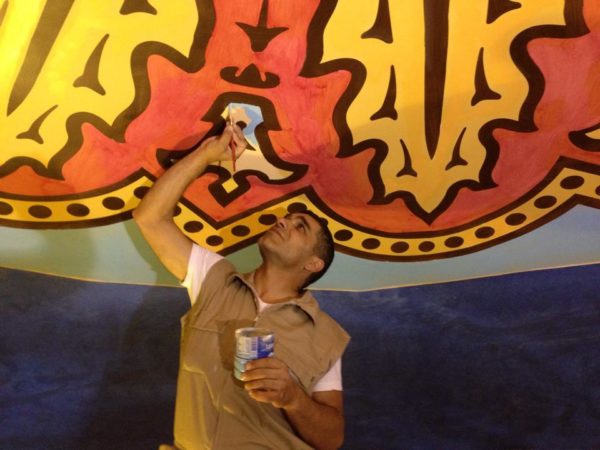The Mohammed al Amine mosque is a landmark in the center of Beirut, since its construction in 2005; it changed the picture of Beirut standing beside the St. George Cathedral; it became the true picture of coexistence of religions in Lebanon. As an Armenian whenever I find a compatriot who has achieved in any success, I feel moved and proud and I am sure this is the exact feeling most of us Armenians have all around the globe.
And also I am sure it should be something unusual that a non-Muslim person works for this very typical Islamic art. How religious people react on it?
I love my career. I work as an artist to provide the best I can and that is always my main concern and dedication; frankly not only in Lebanon where religions coexist, but anywhere outside Lebanon I have never ever had a problem with my religion. When asked how come a Christian is decorating Muslim mosques, my sincere answer will be: “God works in mysterious ways, bringing us together to contribute to His house of worship.”
Read also
Since my early childhood I have been interested in dangerous sports and art, I trained in both mountaineering and arts, being a professional paragliding pilot with no fear of heights and love of art. I combined my passion of adventure and art in huge projects.
I also have seen many photos of your decorative paintings and ornamentations in mosques. In order to master this art, I assume one should know not only traditional Islamic art, but also philosophy, psychology, etc.
I am fortunate enough to be born in Lebanon, in the Middle East, the cradle of civilizations and religions. Unlike what the mass media shows of the unfortunate ugly picture of war and terror, the earth is full of good people. We live with each other, understand each other and copy the good habits and this simple act of accepting each other is beyond any certain philosophy and psychology. As for Islamic art, it has its strict rules and philosophy, need to be creative in artistic touch within those unlimited borders. And the beauty of Arabic calligraphy with its diacritical artistic flow will turn an empty hall into a masterpiece.
You have executed numerous landmark mosques and residential palaces around the world. What countries are the most memorable for you?
I was fortunate enough to travel to and work in numerous countries including many countries in the Persian Gulf, Africa, Europe and the US. And whenever in a new country, I am always interested in their authentic way of working and living. All those counties have left a positive impression on me; but the community and the family I lived with at the Islamic Center of America in Dearborn, Mich. left a life-changing impact in my heart. There I met the purest hearts ever, whose main purpose in life is to spread love and happiness around them.
How many mosques have you worked on?
I am not sure; I have to go through previous data to check the number of mosques (must be more than a dozen). I am sure that I have executed 42 domes and half domes with different shapes and forms at mosques, churches and secular projects.
What is new in 21st century Islamic art?
Art is dynamic; it is in constant change and transformation. For sure contemporary Islamic art is on track for innovation and contemporary mosques are and will be the attraction of future generations.
Have you any experience in working with Christian art and architecture?
Yes, I was fortunate to be involved in the execution and restoration of several churches including a landmark 19th-century authentic Roman church and the restoration of murals at an 18th-century Armenian monastery in Lebanon.
Do you know other Armenian artists who have succeeded in Islamic art?
Yes, for sure. When we go through the history of Ottoman art, we can proudly take credit of architects like Mimar Sinan and the Balian family. And recently I was reading an article about a mosque I executed in the northern coastal area of Lebanon. This mosque was nicknamed the Armenian mosque after the Armenian Mr. Hagop Okajian successfully completed the exterior cladding.
I am sure that the artistic heritage of any culture is worthy of being preserved for future generations. By saying this I cannot help myself to say that the Armenians restored the Persian mosque in Shushi, Artsakh, while the Azerbaijanis, after occupying that city again in last November, began to destroy local Armenian churches, as always, although they ascribe to the Armenian churches of the region another origin. What do you think about this?
The unfortunate events that unfolded recently hit us hard both in Armenia and around the world. Regardless of their religion, people are good and pray to the same God from different perspectives and spread tolerance and love as long as they live in peace and harmony, but unfortunately, political and historic events will fuel hatred and war. History will not forget and forgive the disgrace brought to religious sites as it did with the Crusaders, Ottomans… But as an artist when I look at the Hagia Sophia (built in the sixth century) in Constantinople (Istanbul), I truly thank God that it was transformed into a mosque and restored in the 16th century by the Ottoman empire, otherwise that cornerstone of Byzantine art and architecture would have become rubble and would have vanished. Name it a church, mosque, museum… it is standing there magnificently.
From what part of Armenia/Asia Minor did your ancestors come?
My grandparents were from Adana, as I am told from questionable sources, they were from an area known as Bastia where my family name (Bastajian/Bastadjian) comes from. Their ancestors worked in that area in apricot plantation and as apricot merchants; only the merchants who were outside the area survived the Genocide. My grandmother told a lot of stories about their marching through Syria to reach Lebanon, where she remembers losing her siblings in the desert of Der Zor.
Although you studied at Armenian school, now your environment, I assume, is mostly Arabic. However, can you succeed to impart to your Russian wife and children also some Armenian culture?
I speak, read and write Arabic, Armenian, English and French, I can understand and communicate with difficulty in Russian and Turkish. As for my children, they are fluent in Arabic, English, French and somehow Russian; Armenian is unfortunately an extra language in the community, where they live, but they learn it with great enthusiasm.
My first visit to Armenia was in the early 2000 with my parents and children, at that time Armenia was still recovering from the hardships of war and economic crisis. I had a great time visiting landmark destinations I learned about in the Armenian history book. I took a memorable helicopter trip to lake Sevan. I also fell in love with Tsaghkadzor and spent few days hiking there. My next visit to Armenia was in 2012, Yerevan has already become a top Western tourist destination; I was amazed how much the country has changed and was touched with the promising young generation.
Being an Armenian is not only a heritage, religion or language; it is something that courses in the blood and shapes you into a decent hard working human being, that has no wealth other than your mind making something out of life, and this is what makes us Armenians special anywhere in the world.




















































